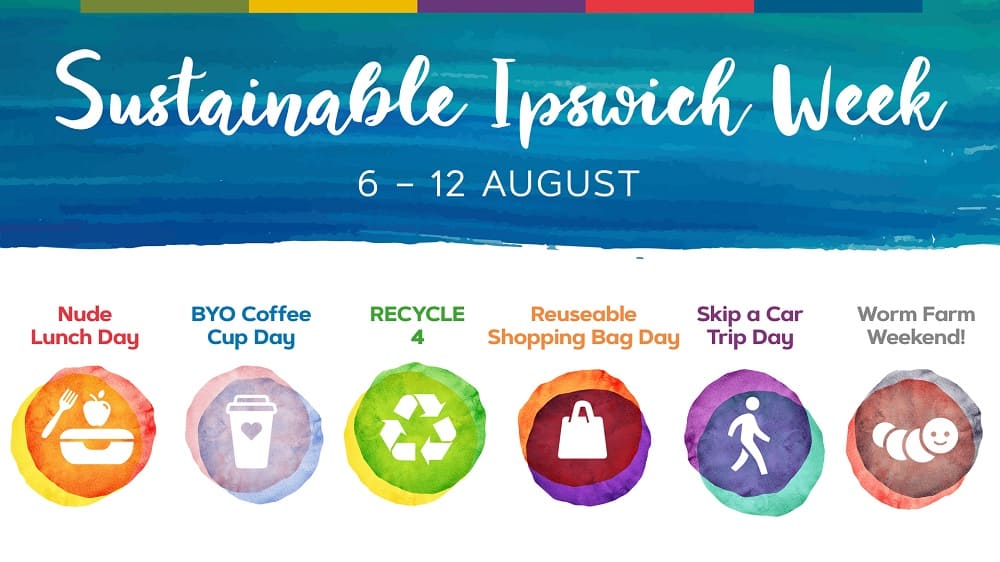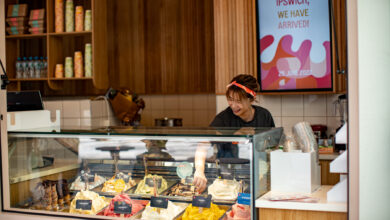We have turned a major corner this year with recycling across the city.
Ipswich City Council’s launched its new recycling program in May and in four months, with the significant support of residents, it has made huge inroads.
Council signed a new contract with Visy Recycling and set about winning the war on waste.
We have worked together with the community to reduce the amount of contamination previously going into our yellow top bins so that we can make our proud city cleaner and greener.
But we can’t stop here. The hard work has really only just begun.
What can you recycle in the yellow top bin?
Council’s Recycle 4 strategy is simple – only four specific categories of recyclables should go into the yellow top bin for your fortnightly kerbside collection service. They are:
Paper – newspaper, magazines, junk mail, office paper
Plastic – bottles and containers (milk, soft drink and shampoo bottles; yoghurt and ice-cream tubs)
Cardboard – boxes including pizza boxes
Cans and Tins – aluminium and steel (drink cans, food tins and aerosol cans)
What is happening with glass?
Glass is an excellent recyclable resource. However, the way we have previously collected it, combining glass with other recyclable materials in the yellow top bin, isn’t ideal.
When the glass is inevitably broken into small pieces during the recycling process, fine pieces can contaminate the other recyclable materials. This is why we asked residents to no longer place glass in the yellow top bin.
Glass will still be recycled – because the last place we all want to see it is in landfill.
And that is why council has teamed up with the world’s largest glass recycler, Owens-Illinois (O-I), with Brisbane and Logan operations, who will take about 2000 tonnes of glass a year from Ipswich for recycling.
That means a lot of glass bottles and jars from Ipswich will be recycled by O-I into new glass bottles that are then sent to local beverage companies in SEQ. This keeps the glass material local and closes the loop from being used, to recycled and then reused again.
For now, we are asking residents to take glass to the Riverview and Rosewood Recycling and Refuse Centres where they can deposit clean glass jars and bottles (without lids) free of charge.
Council plans to have more glass drop-off locations placed around the city – probably at larger shopping centres. Residents will be updated as soon as possible as to these locations.
When will you get a new bin sticker?
A crucial part of council’s recycling campaign is new bin stickers focused on the Recycle 4 message, which have now been delivered to more than 78,000 homes through July and August.
Council contracted workers from local charity organisation yourtown and not-for-profit organisation NORTEC put the brightly coloured stickers on residents’ yellow top bins.
Some bins might have been missed, so stickers might have been put in the mailbox, inside a biodegradable polybag with an instructional insert. Residents were asked to wipe the top of the yellow bin lid, peel the back off the sticker and put it squarely on the top.
If you noticed that your neighbours have the new Recycle 4 bin sticker and you didn’t receive one in your letterbox, the stickers will also be freely available at council customer service centres across the city.
We are trying to make it as simple as possible for residents. You told us you wanted new stickers, clearly spelling out what you can recycle under the new program. And these stickers deliver that message.
What should you do with the Recycle 4 postcard?
Residents should also have recently received a Recycle 4 envelope in the mail with a letter outlining the city’s new recycling strategy –including no glass in the yellow top bin and where to take bottles and jars instead – and a recycling information postcard.
The postcard has a magnet on the back, so residents can put it in an appropriate location in the house or at work. It will serve as a guide to those members of the household not familiar with the new recycling program or what to put in which bin.
Pop it on your fridge is probably easiest. Every time you go the fridge you’ll be reminded of the importance of council’s new recycling strategy, and why it’s so crucial that together we all Recycle 4.
Just remember, if it’s not listed on the Recycle 4 postcard it should not go into the yellow top bin as it’s considered to be contamination, so best to put it in the red top general waste bin.
Why the changes to recycling in Ipswich?
Unfortunately, recycling contamination rates in Ipswich had been steadily increasing, which impacted on our ability to recycle.
This situation, combined with major changes to the industry globally, brought about an immediate rethink as to how council could change practices and work with residents to improve our recycling methods.
As a city, we need to get our recycling contamination rate down from 52 per cent to under 15 per cent. Our first independent audit in July showed contamination rates in yellow top bins had improved, with an average citywide rate of 24.5 per cent.
Individual load contamination rates ranged from 7 to 53 per cent. That shows some people are doing a great job already, while there is definitely room for improvement across the board.
The data we have now (and will continue to gather from further audits) enables us to focus in on specific issues for specific runs and highlights the need for an on-going public education campaign with the aim of reducing contamination to 15 per cent or less.
We want to lead the way with the most environmentally-friendly recycling and waste management system in the country. Ipswich can and will be a national leader, with your help.
To learn more about council’s new recycling program head to www.ipswich.qld.gov.au/recycling or phone 3810 6666 (we encourage you to download the Bin App while here too).
So please, let’s work together to Recycle 4 for Ipswich.

Sustainable Ipswich Week (August 6-12) is an opportunity for the community to be involved in promoting and celebrating sustainability and our environment.
Participate in the range of activities and events throughout the week and learn valuable information on ways in which we can all live more sustainably now and into the future.
You could cut out single-use plastic from your lunch, take a reuseable coffee cup to your favourite cafe, walk or ride to work or school, or set up a worm farm or compost bin.
By working together we can protect and enhance our environment and its liveability for current and future generations.


4.5